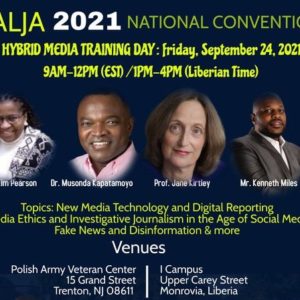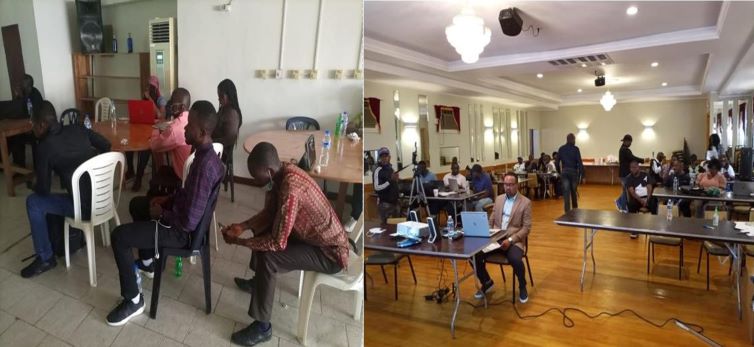PHOTO: (L-R) Participants in Monrovia and USA
By Frank Sainworla, Jr.
Monrovia- A hybrid media training workshop of the Association of Liberian Journalists in the Americas (ALJA) has taken place in Trenton, USA and Monrovia, with several presentations underscoring the crucial role of Journalists in upholding professionalism in the Social Media age.
The workshop, which was live streamed via Zoom, was held on Friday, September 24, 2021 as part of ALJA’s 2021 Convention, with speakers making presentions and interacting with participants on a wide range of issues.
“New Media Technology and Digital Reporting; Media Ethics and Investigative Journalism in the Age of the Social Media; Fake News and Disinformation” was the general theme of the one-day event.
The first speaker, Professor Kim Parson spoke of enduring challenges in the information dissemination process, emphasizing the need for Journalists in Africa and other parts to control their own narrative.
Professor Janet Stewart of the University of Minnesota, who has long years of experience in the mainstream media in the US, reminded Journalists that they can make great impact in covering issues affecting persons with disabilities.
According to her, Journalists have a role to play in making the world a more inclusive place by uncovering and telling great stories about the activities of people with disabilities in both the developing world and the industrialized societies.
This, she said, requires certain critical skills to write impactful stories concerning PwDs. “Listen keenly to them (persons with disabilities) and tell it in their words,” said Prof. Stewart who currently manages a magazine devoted to Pwd issues called, “Impact”.

The needs of persons living with disabilities are six times higher than those without disabilities, Prof. Stewart added.
Another speaker, Dr. Musonda Kapatamoyo from another US University, said that because today’s Journalists find themselves in the multimedia era of convergence, there is a need for to develop the needed skills to multi task.
The Zambian-born University Journalism professor in the US also highlighted the need for Journalists to know the audience they are catering for in this age of the Social Media/Digital Media. It is important to know whether their content is sticking or not, he said.
For the final Speaker, Professor Jane Kirtley who is a veteran Journalist and Lawyer, she first underscored the crucial role of Journalists in building a vibrant democratic society through professional Journalistic investigation of issues.
But at the onset, she was quick to point out that investigative Journalism is “inherently risky”.
Doing an overview of the editorial policies of several news outlets in the US, she cautioned Journalists in her country and Liberia, that despite the advent of the Social Media does not mean that basic Journalistic ethics such as truth telling, fairness, factual reporting, ethics remain relevant to good Journalism.
Quoting one of the editorial policies, Prof. Kirtley said: “Social Media is not a place for personal or political opinion, but rather another platform for a Journalist to do professional work.”
She then cautioned Journalists to exercise professional responsibility even when using their Facebook, Twitter or other Social Media pages, as it could haunt them in the future, citing some recent examples.
As Journalists, Prof. Kirtley advised that they should be careful in friending and liking; comments they make on Facebook/Twitter; and what they share or re-tweet.
Friday’s ALJA hybrid workshop, which was moderated by former LBS broadcast Journalist, Volcano Shelton in the US and facilitated by Journalist Frank Sainworla, Jr. in Monrovia, was described by some participants as enlightening.
Speaking at the close of the workshop, the President of ALJA, Joe Mason described the event as successful and thanked the speakers and all those who participated both in the US and Monrovia for the level of interaction.
Journalists who participated in Monrovia came from various online, print and broadcast media institutions in the country led by the President of the Press Union of Liberia (PUL), Charles Coffey.

